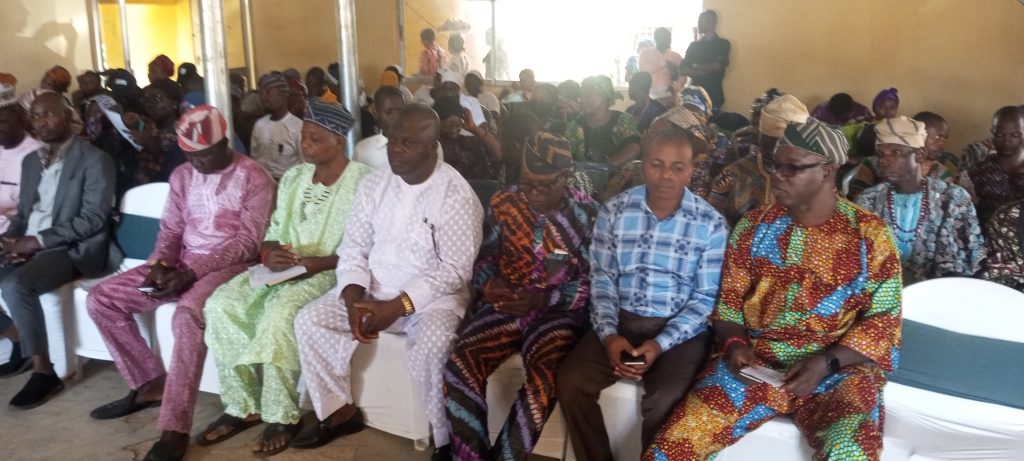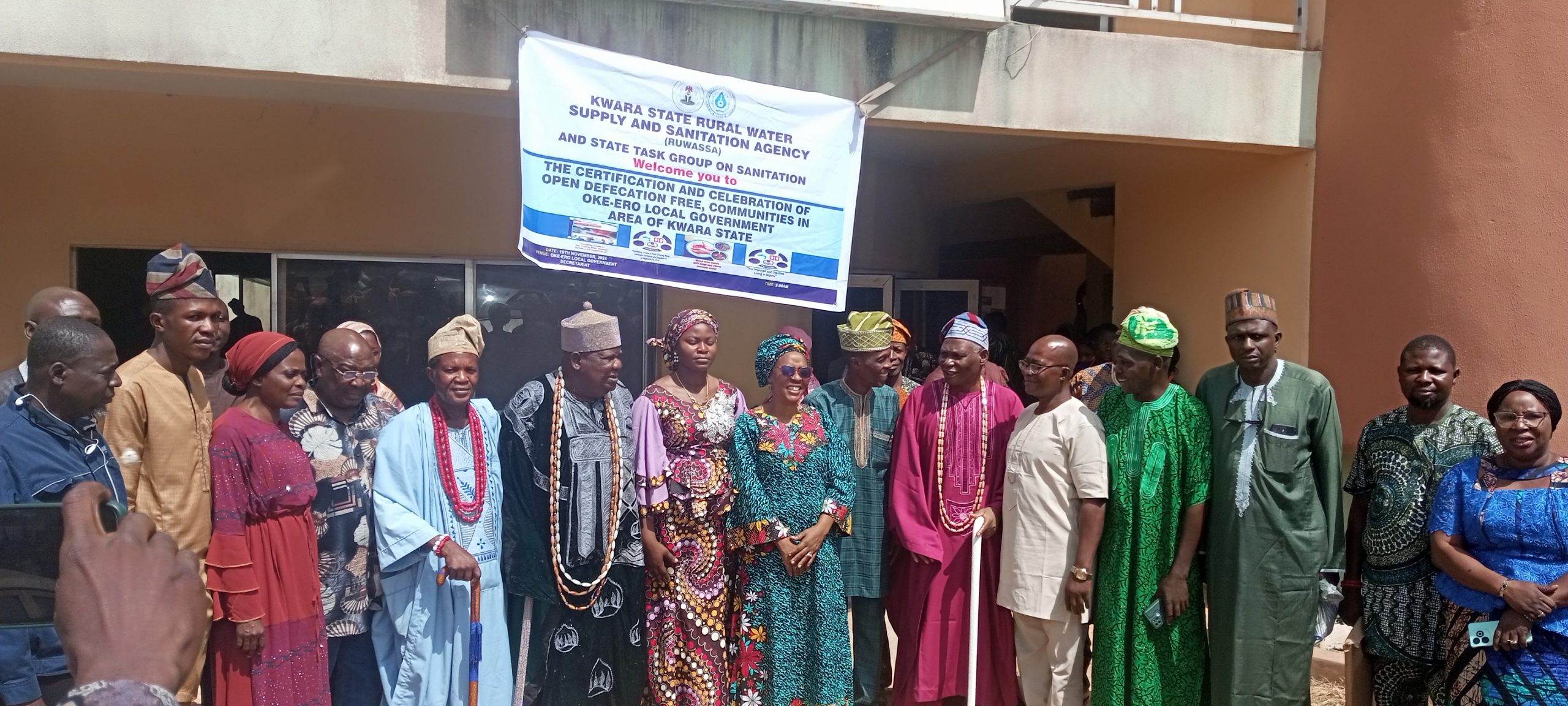Oke-Ero: Lifting Kwara from footnote of open defecation list
By Adeleke Gbenga
Though the journey was slow—agonizingly slow and difficult, long, and tortuous—for the five communities to achieve the feat, the events of November 19, 2024, at Iloffa, the headquarters of Oke-Ero Local Government Area of Kwara State, were a trumpet-blast ceremony. The five communities—Iloffa, Aiyedun, Imode, Egosi, and Ila-Ojiki—claimed to have attained open defecation-free status.
Yet, since man came down from the trees as a primate and evolved further to a savage (i.e., primitive man), he has undergone different phases of civilization. Once upon a time, he practiced open defecation as a savage, just like animals in the wild. In his further evolution from a savage to homo sapiens, a modern man, he hit upon the idea of modern civilization during which he started to use toilets. This, of course, differentiated him from animals with which he once practiced open defecation. And the journey continues to the present.
This symbolically marked the end of open defecation, underlining it as an epitaph to the bygone era of the ancestors. This explains why November 19 every year is marked as World Toilet Day.
But it is very alarming that some parts of the Third World, and a significant percentage of humanity—especially those tagged as poor and underdeveloped countries—still practice open defecation and continue to indulge in it!
Iloffa, Aiyedun, Egosi, Imode, and Ila-Ojiki, however, proved that something good, after all, could come out of Nazareth. The State and Local Government Task Groups on Sanitation reportedly investigated their claims to open defecation-free status thoroughly and awarded them a pass mark. It was in view of this that on November 19, the World Toilet Day, the Kwara State Rural Water Supply and Sanitation Agency (RUWASSA), in partnership with the Kwara State Task Group on Sanitation, recognized the mileage these five communities achieved in the difficult task of making communities open defecation-free in Kwara.
The five communities were to be awarded certificates and celebrated as models in Kwara State. It was a long journey for RUWASSA staff from Ilorin to Iloffa, but the agency soldiered on, performing its legitimate duty of promoting sanitation and hygiene in the State.
The General Manager, Mr. Olorunfemi Oladipo, was down-to-earth in his overview of sanitation intervention in Oke-Ero Local Government Area. He believed the moment, i.e., the certification and celebration of open defecation-free communities in Oke-Ero Local Government Area on November 19, 2024, was a crucial moment in a potent chain of events the agency was highly committed to. And of course, a chain that eventually culminated in the trumpet-blast ceremony of the day.
The General Manager described the achievements in open defecation-free status as a difficult uphill task, reiterating that only one state among the 36 states of the Federation had been able to achieve a 100% open defecation-free status. He stressed that these communities in Oke-Ero Local Government Area—Iloffa, Aiyedun, Imode, Egosi, and Ila-Ojiki—deserved the awards and needed to be celebrated in view of the widespread failure of many local governments and states to attain the status.
“The significance of today is huge. Today is World Toilet Day, so we seized the opportunity to recognize five communities in Oke-Ero Local Government Area that claimed to have become open defecation-free, which is a global theme. To claim open defecation-free status is no mean feat. Only one state in the whole of Nigeria has been 100% open defecation-free. We have so many local governments, and for us in Kwara to have five communities attaining open defecation-free status is a feat we must all celebrate,” Mr. Olorunfemi Oladipo said.
Further, he noted, looking askance at the protocols of open defecation-free status.
“The protocols are strict, which is why we still have a low number of states and local governments. 2025 is the global terminal date, but nothing is impossible with all hands on deck.”
He thanked the Governor of the State, Mallam AbdulRahman AbdulRasaq, whose support, according to the General Manager, made the feat achieved by the five communities possible. “I believe we can achieve more than this. What we did was to make sure that at least 90% of households in each of these communities had their own toilets. Also, through the efforts of the state government, we made sure that public places like markets, motor parks, and schools were provided with toilets—simple smart toilets. These were funded by the state government. It is no mean feat, like I said. We thank all stakeholders who rallied their support for our efforts,” he delivered his speech with his usual aplomb.
Also speaking, the Permanent Secretary of the Ministry of Water Resources, Mrs. Christiana Asonibare, who represented the Commissioner, declared that open defecation around the world is a huge challenge to humanity. “This year’s World Toilet Day is titled ‘Toilet: The Place of Peace’. To return this peace to our communities, there is every need to eradicate open defecation. The State Government recently paid a counterpart fund of ₦300 million for this exercise. It would be recalled that the State Government, through RUWASSA, launched an open defecation-free programme a few years back in Oke-Ero, specifically at Iloffa, the headquarters.
This was replicated in Kwara Central and Kwara North Senatorial Districts, respectively,” Mrs. Christiana Asonibare noted in her declaration. She observed that the five communities that claimed open defecation-free status were to be awarded certificates and celebrated, highlighting the significance of the occasion as an achievement for the state.
Mrs. Asonibare noted further that the five communities’ sanitation and hygiene were thoroughly screened and assessed before they were accepted and recognized as truly open defecation-free. “We need to give Oke-Ero a huge applause,” she said, to which there was thunderous applause from the audience in a standing ovation. The audience was made up of Oke-Ero Local Government staff, the traditional rulers of the five communities being awarded certificates and celebrated, and a few members of the communities.
Mrs. Asonibare said further: “Today, I am happy to inform you that five communities in Oke-Ero have attained open defecation-free status. They include Iloffa, Aiyedun, Imode, Egosi, and Ila-Ojiki. This laudable feat was made possible through the efforts and cooperation of all the stakeholders, especially the traditional rulers of these communities. Other stakeholders who made this feat possible were the Iyaloja, Babaloja, and all the Community Development Associations. We really appreciate you all.”

She solicited more support, like Oliver Twist, for the administration of Governor AbdulRahman AbdulRasaq to do more.
In his own opening remarks, the Chairman of Oke-Ero Local Government Area, Honorable James Abiodun Fadipe, who was at the occasion with all members of his team, described the occasion as a significant milestone in the health and environmental sanitation of Oke-Ero Local Government. He said, “Today, RUWASSA is recognizing and awarding certificates to some of our communities for achieving the remarkable status of being open defecation-free. This achievement is not only a testament to the diligence and commitment of these communities but also a reflection of the unwavering support and visionary leadership of Governor AbdulRahman AbdulRasaq. Under his administration, we have witnessed a deliberate and concerted effort to improve public health, hygiene, and environmental sanitation across the state.”
He said further: “I commend RUWASSA for its tireless efforts and consistent support in ensuring that our communities adopt safe hygiene practices. Your dedication to this noble cause has truly made a positive impact on the lives of our people.”
The highlight of the occasion was the recognition of the traditional rulers of the five communities and the presentation of certificates to each of them amidst a blaze of lights from cameramen. There was a brief interlude of cultural dance with Ekiti songs in the Ekiti dialect to entertain the audience. It was all about Ekiti folklore. Responding on behalf of the traditional rulers, the Elegosi of Egosi Kingdom, His Royal Highness Oba Daniel Adefila Dada, described the occasion as epoch-making in spite of its low-key status. He thanked the Ministry of Water Resources and RUWASSA for the programme. He charged RUWASSA to follow up on the achievement so that the communities do not relent.

